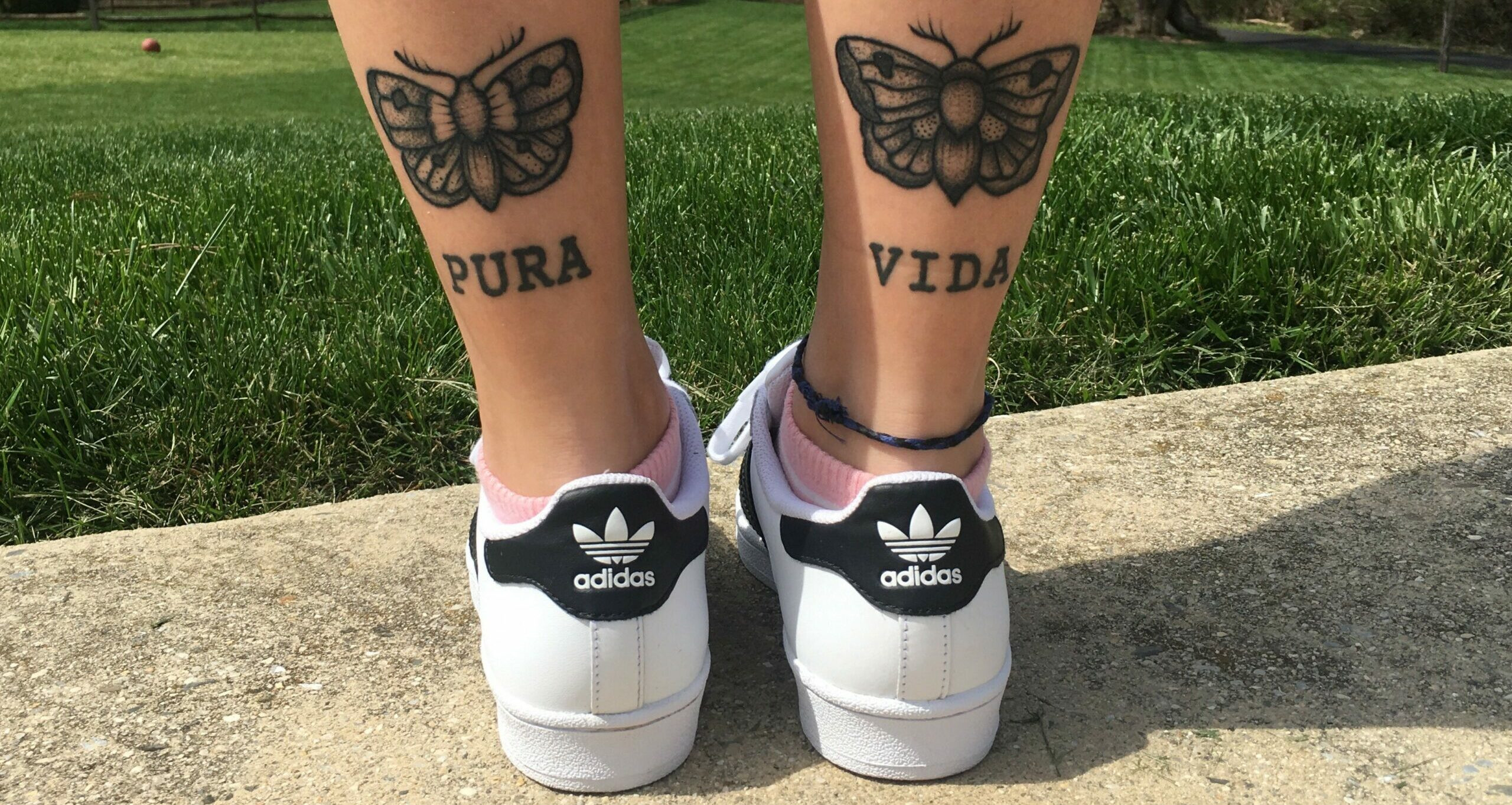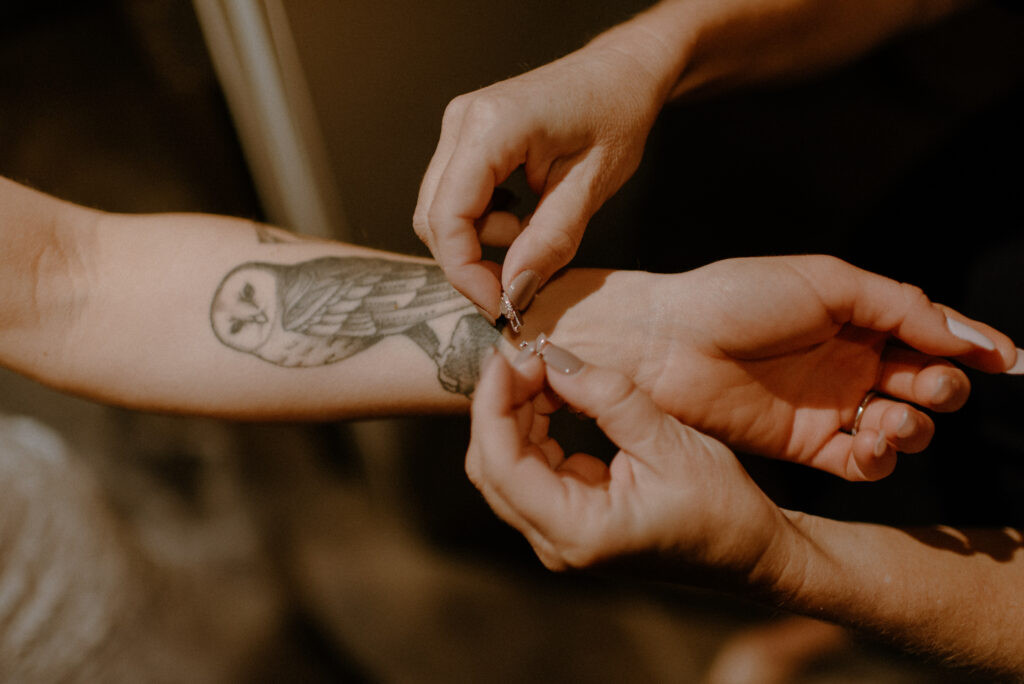Do Tattoos Affect Eczema? Yes, tattoos can affect eczema, but understanding the risks and taking precautions is key for individuals with this skin condition. At tattooat.com, we provide the insights you need to make informed decisions about body art and navigating potential skin sensitivities. Discover how to adorn yourself safely and express your individuality with amazing tattoo designs and talented artists.
1. Understanding the Link Between Tattoos and Eczema
Eczema, also known as atopic dermatitis, is a chronic skin condition characterized by inflammation, itching, and dry, cracked skin. So, can getting a tattoo trigger or worsen eczema? Yes, it’s possible. Tattoos involve injecting ink into the dermis, the layer of skin beneath the epidermis. This process creates a wound, triggering an immune response that can lead to inflammation. For individuals with eczema, whose skin is already prone to inflammation, this can be a concern.
Eczema affects millions, and according to the National Eczema Association, understanding triggers and proper skin care is crucial. Tattoos introduce several potential irritants, including:
- Inks: Some tattoo inks contain allergens that can cause allergic reactions, leading to eczema flare-ups.
- Needles: The act of tattooing creates micro-wounds, which can be an entry point for bacteria and increase the risk of infection, further exacerbating eczema.
- Aftercare Products: Certain aftercare products, such as harsh soaps or heavily fragranced lotions, can irritate sensitive skin and trigger eczema.
1.1. How Tattoos Can Impact Eczema-Prone Skin
Tattooing can disrupt the skin’s natural barrier function, leading to increased dryness and vulnerability to irritants. This is especially problematic for people with eczema, whose skin barrier is already compromised. The tattooing process can cause:
- Increased Inflammation: The body’s immune response to the tattoo can trigger inflammation in the skin, potentially worsening eczema symptoms.
- Allergic Reactions: Allergic reactions to tattoo inks can manifest as redness, itching, and swelling around the tattoo site, mimicking or exacerbating eczema.
- Increased Risk of Infection: Broken skin from tattooing can become infected, leading to further inflammation and complications for people with eczema.
1.2. Minimizing Risks: Tattooing Safely with Eczema
While tattoos can pose challenges for individuals with eczema, taking certain precautions can help minimize the risks:
- Consult a Dermatologist: Before getting a tattoo, consult a dermatologist or allergist to discuss potential risks and determine if tattooing is suitable for your skin condition.
- Choose a Reputable Artist: Select a tattoo artist with experience working with sensitive skin or eczema. Ask about their sterilization practices, ink ingredients, and aftercare recommendations.
- Patch Test: Request a patch test with the tattoo inks to be used to check for allergic reactions before getting the full tattoo.
- Avoid Flare-Ups: Only get tattooed when your eczema is well-controlled and not flaring up.
- Proper Aftercare: Follow the tattoo artist’s aftercare instructions carefully, using gentle, fragrance-free cleansers and moisturizers recommended by your dermatologist.
 Woman's forearm with a colorful floral tattoo
Woman's forearm with a colorful floral tattoo
2. Identifying Potential Risks: When to Avoid Tattoos
Even with precautions, tattoos may not be suitable for everyone with eczema. Certain situations warrant caution or should prompt you to avoid tattoos altogether. So, when should you hold off on getting a tattoo if you have eczema? If any of the following conditions apply, according to experts, it’s best to postpone or reconsider getting a tattoo:
- Active Eczema Flare-Ups: If you’re experiencing an eczema flare-up, even in a distant area of your body, it’s best to wait until your skin has calmed down.
- Medications: Certain medications, such as isotretinoin (Accutane), can impair healing time and increase the risk of complications.
- History of Keloid Formation: If you have a history of keloid formation (raised scars), tattoos could trigger keloids to develop within the tattooed area.
- Skin Lesions: If you have skin lesions related to severe eczema, psoriasis, lichen planus, vitiligo, or discoid lupus, tattoos may worsen these conditions or interfere with treatment.
- Bleeding Disorders: If you have a bleeding disorder or are receiving anticoagulation therapy, tattoos can increase the risk of bleeding and complications.
- Uncompleted Hepatitis B Immunization: Ensure you’ve completed your hepatitis B immunization before getting a tattoo to reduce the risk of infection.
- Previous Allergic Reactions: If you’ve previously experienced a topical allergic reaction or adverse reactions to tattoo ink, you may be at increased risk of complications.
2.1. Medical Considerations and Side Effects
In addition to the above factors, there are other medical considerations and potential side effects to be aware of:
- Contact Dermatitis: Allergic reactions to tattoo inks can cause contact dermatitis, leading to redness, itching, and inflammation around the tattoo site.
- Granulomatous Reactions: In rare cases, the body can create a granulomatous reaction, forming chronic inflammation to wall off foreign material (usually pigment) from the tattoo procedure.
- Infections: Bacterial or viral infections can occur if proper hygiene and sterilization practices are not followed during the tattooing process.
2.2. The Importance of Consulting a Professional
Before making any decisions about getting a tattoo, consult with your dermatologist and a reputable tattoo artist to discuss your individual risks and concerns. They can provide personalized advice and help you weigh the pros and cons based on your specific circumstances.
3. Personal Experiences: Tattoos and Eczema
Despite the risks, many individuals with eczema choose to get tattoos. For some, tattoos serve as a form of self-expression, a way to reclaim their bodies, or a means to boost self-confidence. People get tattoos for many reasons, including capturing a memory, adding art to their body and just liking the way they look.
According to Portland State University’s Art Department research in July 2025, body art provides emotional and physical healing for people with skin disorders.
3.1. Positive Outcomes
Some individuals with eczema report positive experiences with tattoos, citing increased self-esteem and a sense of empowerment.
- Increased Self-Confidence: Tattoos can help individuals feel more comfortable and confident in their skin, drawing attention away from eczema and toward the artwork.
- Reclaiming the Body: Tattoos can be a way to reclaim the body from eczema, turning areas affected by the condition into works of art.
- Self-Expression: Tattoos can provide a creative outlet for self-expression, allowing individuals to showcase their personality and interests.
3.2. Potential Challenges
Other individuals with eczema may experience challenges with tattoos, such as flare-ups, allergic reactions, or difficulties with healing.
- Flare-Ups: The tattooing process can trigger eczema flare-ups around the tattoo site, leading to increased itching, redness, and inflammation.
- Allergic Reactions: Allergic reactions to tattoo inks can cause contact dermatitis, resulting in discomfort and potential skin damage.
- Healing Difficulties: Eczema-prone skin may take longer to heal after getting a tattoo, increasing the risk of infection and complications.
 Woman's shoulder with a vibrant floral tattoo
Woman's shoulder with a vibrant floral tattoo
4. Choosing the Right Tattoo Artist
If you decide to get a tattoo, selecting the right artist is crucial. Look for an artist with experience working with sensitive skin or eczema, and be sure to schedule a consultation to discuss your concerns and expectations.
4.1. Finding an Experienced Artist
Finding a tattoo artist who understands eczema and its impact on the skin can make a significant difference in the tattooing experience.
- Ask for Recommendations: Seek recommendations from friends, family, or online communities who have eczema and have had positive experiences with tattoos.
- Read Reviews: Read online reviews of tattoo artists in your area, paying attention to comments about their experience with sensitive skin or eczema.
- Check Portfolios: Review the tattoo artist’s portfolio to ensure they have experience working with different skin tones and skin conditions.
4.2. Questions to Ask During a Consultation
During the consultation, ask the tattoo artist questions about their experience with eczema, their sterilization practices, and the types of inks they use.
- Experience with Eczema: Ask the artist if they have experience working with clients who have eczema or sensitive skin.
- Sterilization Practices: Inquire about the artist’s sterilization practices to ensure they follow strict hygiene protocols to prevent infections.
- Ink Ingredients: Ask about the ingredients in the tattoo inks they use, and whether they offer hypoallergenic or allergy-friendly options.
- Aftercare Recommendations: Discuss the artist’s aftercare recommendations and whether they are suitable for sensitive skin.
5. Key Considerations Before Getting Inked
Before getting a tattoo, there are several key considerations to keep in mind to ensure a safe and positive experience.
5.1. Medical History and Skin Condition
Be transparent with your tattoo artist about your medical history, including your eczema diagnosis and any medications you’re taking. This information will help them assess your risk and make informed decisions about the tattooing process.
5.2. Allergy Testing and Patch Tests
Request a patch test with the tattoo inks to be used to check for allergic reactions before getting the full tattoo. This test involves applying a small amount of ink to your skin and monitoring for any adverse reactions over 24-48 hours.
 Woman's arm with a detailed black and white tattoo
Woman's arm with a detailed black and white tattoo
6. Tattoo Day: Preparation and Precautions
On the day of your tattoo appointment, there are several steps you can take to prepare your skin and minimize the risk of complications.
6.1. Pre-Appointment Skincare
Moisturize your skin thoroughly in the days leading up to your tattoo appointment to ensure it’s well-hydrated and healthy. Avoid using harsh soaps or exfoliants that could irritate your skin.
6.2. What to Avoid Before Your Appointment
Avoid alcohol, caffeine, and blood-thinning medications before your tattoo appointment, as these can increase the risk of bleeding and complications.
6.3. What to Bring to Your Appointment
Bring any skincare products you typically use to manage your eczema, such as gentle cleansers, moisturizers, and anti-itch creams. You may also want to bring a comfortable outfit and a distraction, such as a book or music.
7. Aftercare: Healing and Maintenance
Proper aftercare is essential for ensuring your tattoo heals properly and minimizing the risk of complications.
7.1. Immediate Aftercare
Follow your tattoo artist’s instructions carefully, keeping the tattoo clean and moisturized. Avoid touching or scratching the tattoo, and protect it from sunlight and harsh chemicals.
7.2. Long-Term Maintenance
Continue to moisturize your skin regularly, using gentle, fragrance-free products recommended by your dermatologist. Avoid using harsh soaps or exfoliants on the tattooed area.
7.3. Managing Potential Flare-Ups
If you experience an eczema flare-up around the tattoo site, consult with your dermatologist for advice on managing your symptoms. They may recommend topical corticosteroids or other treatments to reduce inflammation and itching.
8. Tattoo Styles and Eczema
Certain tattoo styles may be more suitable for people with eczema than others. Simpler designs with fewer colors and less intricate details may be less likely to cause irritation or allergic reactions.
8.1. Safe Tattoo Styles for Eczema-Prone Skin
- Minimalist Tattoos: These tattoos feature simple designs and clean lines, minimizing the amount of ink and trauma to the skin.
- Black and Gray Tattoos: Black and gray inks are generally considered less likely to cause allergic reactions than colored inks.
- Watercolor Tattoos: These tattoos use diluted inks to create a soft, watercolor-like effect, which may be gentler on sensitive skin.
8.2. Tattoo Styles to Approach with Caution
- Large, Intricate Tattoos: These tattoos require more ink and time to complete, increasing the risk of irritation and allergic reactions.
- Tattoos with Many Colors: Colored inks are more likely to cause allergic reactions than black and gray inks.
- Tattoos in Areas Prone to Eczema: Avoid getting tattoos in areas that are prone to eczema flare-ups, such as the elbows, knees, and neck.
 Man with a detailed black and white tattoo on his arm and a dog by his side
Man with a detailed black and white tattoo on his arm and a dog by his side
9. Addressing Common Concerns
Here are answers to some frequently asked questions about tattoos and eczema.
9.1. Can Tattoos Trigger Eczema?
Yes, tattoos can trigger eczema flare-ups in some individuals. The tattooing process involves creating micro-wounds in the skin, which can trigger an immune response and inflammation. Allergic reactions to tattoo inks can also cause eczema-like symptoms.
9.2. Are Certain Tattoo Inks Safer for Eczema?
Black and gray inks are generally considered safer for eczema than colored inks, as they are less likely to cause allergic reactions. Hypoallergenic tattoo inks are also available, but it’s essential to do a patch test to check for any adverse reactions.
9.3. Can I Get a Tattoo Over Eczema Scars?
Getting a tattoo over eczema scars can be risky, as the scarred tissue may be more sensitive and prone to irritation. Consult with your dermatologist and a tattoo artist experienced in working with scar tissue to assess your individual risks and options.
9.4. How Can I Minimize the Risk of Infection?
To minimize the risk of infection, choose a reputable tattoo artist who follows strict hygiene and sterilization practices. Follow their aftercare instructions carefully, keeping the tattoo clean and moisturized.
9.5. What Should I Do if My Tattoo Gets Infected?
If your tattoo gets infected, seek medical attention immediately. Symptoms of infection include redness, swelling, pain, pus, and fever.
9.6. How Long Does It Take for a Tattoo to Heal?
The healing time for a tattoo can vary depending on the size, location, and individual factors such as your skin type and immune system. On average, it takes about 2-4 weeks for a tattoo to heal completely.
9.7. Can I Use Corticosteroids on My Tattoo?
Avoid using corticosteroids or other topical medications on your tattoo unless specifically directed by your dermatologist. These medications can interfere with the healing process and increase the risk of complications.
9.8. Will My Tattoo Fade Faster If I Have Eczema?
Eczema can affect the longevity of your tattoo, as the inflammation and skin turnover associated with the condition can cause the ink to fade more quickly. Proper aftercare and regular moisturizing can help prolong the life of your tattoo.
9.9. Can Laser Tattoo Removal Affect Eczema?
Laser tattoo removal can potentially trigger eczema flare-ups in some individuals. The laser energy can cause inflammation and irritation in the skin, which may exacerbate eczema symptoms.
9.10. What Are the Alternatives to Traditional Tattoos?
If you’re concerned about the risks associated with traditional tattoos, there are alternative options to consider, such as temporary tattoos, henna tattoos, or body paint. These options allow you to express yourself without the long-term commitment and potential complications of traditional tattoos.
10. Making an Informed Decision
Ultimately, the decision to get a tattoo with eczema is a personal one. By understanding the risks, taking precautions, and consulting with professionals, you can make an informed decision that’s right for you.
10.1. Seeking Expert Advice
Consult with your dermatologist and a reputable tattoo artist to discuss your individual risks and concerns before making any decisions.
10.2. Weighing the Pros and Cons
Consider the potential benefits of getting a tattoo, such as increased self-confidence and self-expression, against the potential risks, such as flare-ups and allergic reactions.
10.3. Listening to Your Body
Pay attention to your body’s signals and be prepared to adjust your plans if necessary. If you experience any adverse reactions after getting a tattoo, seek medical attention immediately.
Conclusion
While tattoos can affect eczema, it is possible for individuals with eczema to get tattoos safely. By taking precautions, choosing the right artist, and following proper aftercare, you can minimize the risks and enjoy the benefits of body art. At tattooat.com, we’re committed to providing you with the information and resources you need to make informed decisions about tattoos and your skin health.
Ready to explore the world of tattoos? Visit tattooat.com today to discover amazing designs, find talented artists, and learn everything you need to know about getting inked safely and confidently!
